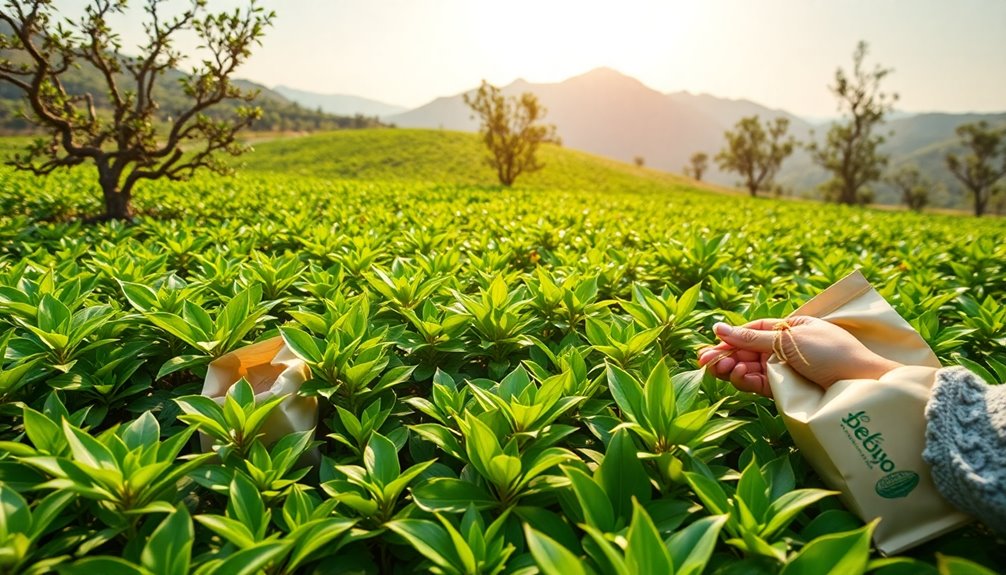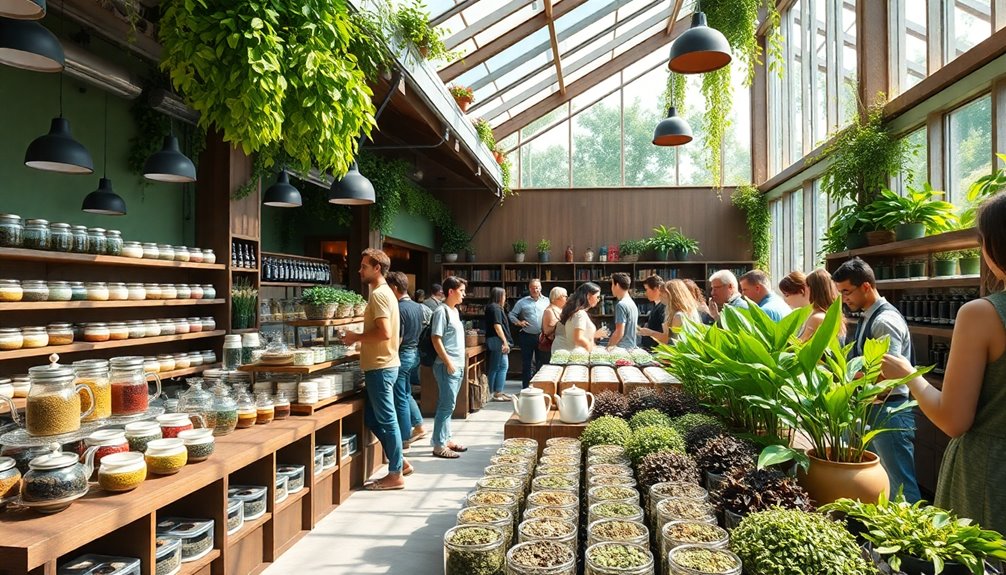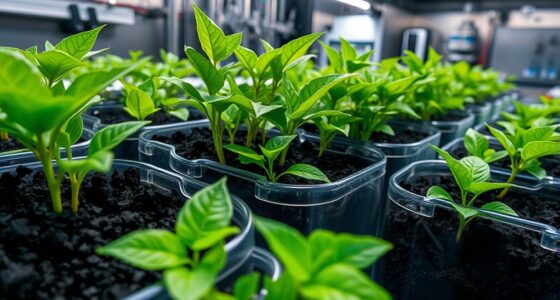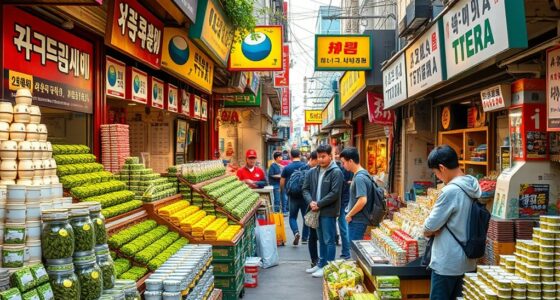If you're interested in tea startups that blend innovation with tradition, you've got plenty to watch. Companies like Karma Tea focus on ethical sourcing and use blockchain for transparency. Others, like Senbird Tea, work with Japanese farmers, emphasizing organic practices. You'll see a surge in unique blends and convenient products, perfect for busy lifestyles. Sustainability and quality are top priorities, reflecting shifting consumer preferences toward health-conscious options. These brands are revamping the tea experience while respecting its roots. Curious about which specific startups are leading this trend? There's more to discover!
Key Takeaways
- Startups like Volition Tea and Karma Tea Company blend traditional tea practices with modern transparency and ethical sourcing to appeal to conscious consumers.
- The rise of unique tea blends and convenient brewing options has been fueled by increased consumer demand during the COVID-19 pandemic.
- Companies are leveraging blockchain technology for traceability, enhancing quality assurance and ethical sourcing in the tea supply chain.
- Sustainable practices, such as biodegradable packaging and partnerships with small-scale farmers, are becoming essential for new tea brands to meet consumer expectations.
- Innovations in convenience, including ready-to-brew tea bags and instant mixes, cater to busy lifestyles while maintaining the quality and flavor of traditional teas.
Introduction

The tea industry is increasingly buzzing with innovative startups that are reshaping how we experience this beloved beverage. These emerging companies are blending traditional practices with modern consumer preferences, setting new standards for quality and sustainability in the global tea community.
You'll notice brands like Volition Tea and Karma Tea Company making a mark by prioritizing transparency in sourcing and ethical practices, which enhances consumer trust and engagement.
The COVID-19 pandemic has spurred a surge in demand for high-quality tea products, prompting these startups to innovate with unique blends and convenient brewing options. Companies such as Longleaf Tea Company and Nepal Tea are gaining recognition not just for their distinctive offerings but also for their commitment to supporting local tea farmers and communities. Additionally, many of these startups are taking inspiration from other traditional beverages, such as yerba mate, to diversify their product lines and appeal to a broader audience.
Events like the World Tea Conference + Expo serve as vital platforms for these startups, allowing them to showcase their innovations and connect with industry leaders.
As you explore this vibrant landscape, you'll see how these tea startups aren't only meeting consumer preferences but also fostering a sustainable future for the tea industry. Keep an eye on these trailblazers as they redefine what tea can be.
Sustainable Tea Production Practices

Sustainable tea production practices are becoming increasingly important as consumers seek products that not only taste great but also promote environmental health. Brands like Senbird Tea exemplify this shift by collaborating with small-scale tea farmers in Japan who use organic farming methods. These practices enhance soil health while preserving traditional flavors.
Karma Tea Company takes it a step further, prioritizing sourcing from small producers and utilizing biodegradable packaging, showcasing their commitment to sustainability and reducing environmental impact.
Senbird's innovative introduction of refillable tea tins is a game-changer, minimizing packaging waste and encouraging eco-friendly consumption. Meanwhile, the Nepal Tea Foundation is making strides by supporting sustainable initiatives that focus on education and housing, ensuring fair compensation for tea producers through direct sourcing.
Kiani Tea partners with the Eden Reforestation Project to combat deforestation, illustrating a dedication to environmental sustainability and community engagement in their tea production practices.
Ultimately, these startups highlight the importance of sustainable tea production, fostering a market that values both quality and ethical practices, allowing you to enjoy your tea while supporting a healthier planet.
Sustainable Sourcing of Tea Leaves

Increasingly, tea startups are focusing on sustainable sourcing of tea leaves to meet the demands of conscious consumers. Companies like Karma Tea and Kiani Tea are leading the charge by partnering directly with small producers, ensuring fair compensation, and supporting local economies. This approach not only promotes ethical practices but also fosters a positive change in tea culture.
Senbird Tea takes it a step further by exclusively collaborating with family-owned, small-scale farmers in Japan who embrace organic farming methods, preserving traditional tea practices while delivering high-quality products.
Transparency in sourcing is vital, and Nepal Tea exemplifies this by connecting consumers directly with tea producers, highlighting sustainable agricultural practices. Additionally, many of these tea varieties, like those sourced from local farms, can provide various health benefits that enhance overall well-being.
Moreover, many startups are adopting eco-friendly packaging solutions, like Senbird's refillable tea tins, which reduce waste and encourage you to engage in environmentally responsible behaviors.
As you explore these brands, you'll notice that their commitment to sustainable sourcing reflects a broader industry shift towards environmental responsibility and the growing consumer demand for ethically produced products.
Embracing these innovations not only enhances your tea experience but also contributes to a more sustainable future.
Blockchain in Tea Traceability

As consumers demand greater transparency in their food choices, blockchain technology is stepping into the spotlight in the tea industry. This innovative solution enhances traceability by creating a secure, transparent ledger that documents each stage of the tea supply chain, from cultivation to your cup.
Tea startups like Karma Tea Company are harnessing blockchain to share detailed information about their teas' origins, including the farms and production methods, which fosters consumer trust and education.
By implementing blockchain, these companies can significantly reduce fraud and improve quality assurance. You can easily verify the authenticity of your tea through a simple QR code scan, ensuring you're getting what you pay for.
Moreover, this technology supports sustainability initiatives by enabling traceability of ethical sourcing practices, ensuring fair compensation for farmers who contribute to the global tea industry.
As of 2023, the global blockchain in the food and beverage market, including tea, is expected to grow at a staggering CAGR of over 48%. This reflects the increasing demand for transparency and traceability among consumers, making blockchain a vital tool for innovation and sustainability in the tea sector.
Market Competition and Pricing Pressures

The tea market is thriving, with competition heating up as startups vie for a slice of the projected $4.8 billion bubble tea sector by 2032. In this new world of tea businesses, you'll notice how market competition is intensifying.
Emerging tea brands face mounting pressure to maintain strategic pricing while ensuring their offerings remain high quality. Consumers are increasingly willing to pay more for sustainably sourced and ethically produced teas, which complicates pricing strategies.
To attract younger demographics seeking authentic experiences, tea brands must innovate without sacrificing quality. With over 5,000 stores globally, the rapid expansion of these businesses means they need to adopt creative approaches to stand out.
Automation and technology, exemplified by companies like Xiao Guan Tea, are helping to reduce costs and enhance production efficiency, impacting overall pricing models.
Moreover, heightened consumer awareness of health benefits and sustainability trends pushes startups to differentiate themselves. As they balance quality and affordability, they often find themselves squeezed by pricing pressures.
Navigating these challenges requires agility and a commitment to offering value in an increasingly competitive landscape.
Practical Applications

Navigating the competitive tea landscape leads many startups to embrace innovative practical applications that resonate with today's consumers. Companies like Volition Tea and Karma Tea Company emphasize transparency in sourcing, allowing you to make informed choices while supporting small producers.
This focus on social responsibility aligns with your growing consumer preferences for ethically sourced products.
Senbird Tea takes it a step further by blending Japanese cultural elements with high-quality offerings, collaborating directly with family-owned tea farmers. Their introduction of refillable tea tins highlights a commitment to sustainability, reducing packaging waste in tea making.
To cater to your fast-paced lifestyle, startups are also innovating with ready-to-brew tea bags and instant mixes. These products balance quality and convenience, ensuring you don't have to compromise on taste even when time is tight.
Events like the World Tea Expo showcase these innovations, providing a platform for tea brands to network and share best practices.
As you explore these emerging brands, you'll find that their commitment to quality, sustainability, and consumer preferences makes them stand out in the ever-evolving tea market.
Conclusion
In the ever-evolving tea industry, you can't overlook the exciting innovations that blend tradition with modern practices. By embracing sustainable production and sourcing methods, and leveraging blockchain for traceability, tea startups are reshaping the market landscape. With increased competition and pricing pressures, these companies are not just surviving; they're thriving. Keep an eye on these trailblazers, as they're set to redefine your tea experience while prioritizing the planet and quality.










